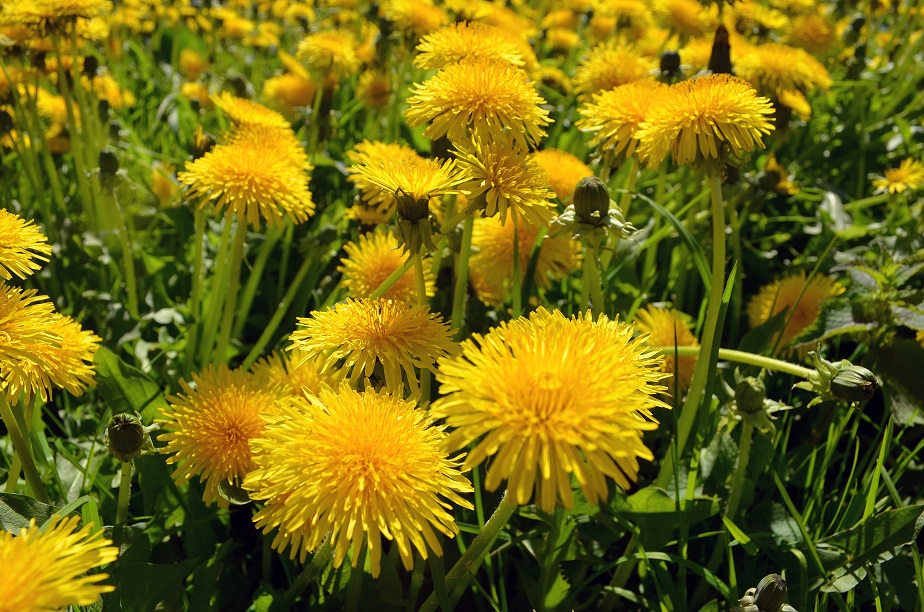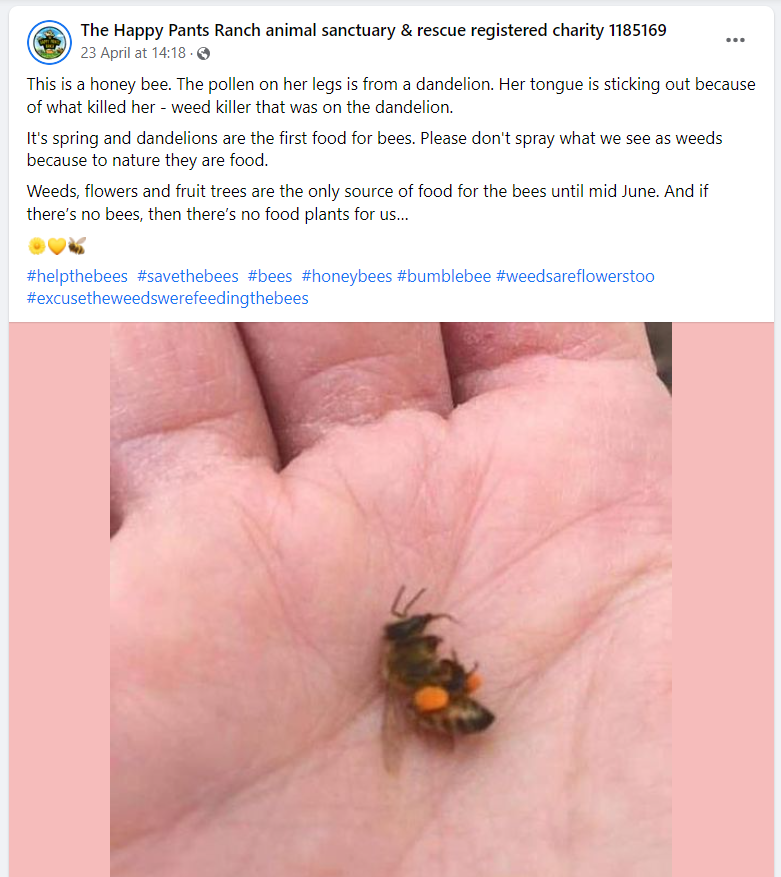Up with weeds!
“Weeds are wild plants in the wrong place”
- RHS website

It’s Spring! Growing season!
New buds and blossom everywhere... and the weeds are stealing a march on me at the allotment. It’s not as bad as it’s been some years – I actually thought we were making some good progress, and was just putting away my tools the other day when a friendly allotment committee member came over and told me “those dandelions are going to seed everywhere...” I would swear they weren’t there the previous day. When she pointed them out to me I just thought how beautiful they were. This is progress because there was a time when I, like many gardeners, felt simply overwhelmed by the proliferation of these “weeds” and all the new seeds arriving from neighbours daily. But I’ve got to know them better now. That day last week I actually made myself late for meeting a friend by going round collecting all the gorgeous yellow flower heads to take home and swiftly turn into dandelion shortbread – I reasoned if the bees couldn’t have them, I wasn’t going to waste them – but I didn’t want my neighbour reaching for the RoundUp if I left them there and they seeded over her immaculate beds!
In a previous post I outlined that God made us to tend gardens – that was the original design. But to many people in possession of outside space, that means “having a neat lawn” and “keeping the weeds at bay” (or worst of all, laying an awful soulless plastic lawn). On the eve of #NoMowMay, if that’s where you sit, I’m hoping to make you think again.
What does this have to do with faith? What does the Bible say about weeds? The passages that come to my mind immediately are,
-
Genesis 3:17-18 “cursed is the ground because of you; through painful toil you will eat food from it all the days of your life. It will produce thorns and thistles for you...”
-
Proverbs 24 “I passed by the field of the sluggard and by the vineyard of the man lacking sense, and behold, it was completely overgrown with thistles; its surface was covered with nettles”
-
Mark 4/Matt. 13/Luke 8: the Parable of the Sower, where thorns choke some of the seedlings
-
Matthew 13 the parable of the weeds, where “an enemy” sows weeds among the wheat, but the farmer instructs his workers not to do the weeding in case they root up the wheat along with them.
So, according to Genesis 3, “weeds” – unwanted plants, things which make our efforts to produce food crops more difficult – are a product of the Fall. How many weeds are visible in my veg plot testify to how much of a “sluggard” I am in tending it! Speaking into a culture well versed in agriculture (unlike ours), Jesus used weeds/thorns as a metaphor for “the cares of this world, the deceitfulness of riches, desires for other things” which get in the way of his Word being fruitful in our lives. I suspect my chaotic daily life is more overrun with these sorts of weeds than my allotment is with creeping buttercup.
But then, to go back to botany rather than metaphor, I’m not sure it follows that all that we consider “weeds” are in fact evil or wholly bad. And I’ve found it often really is better to let some weeds grow side by side my intended crop for a while. All plants are created by God, and if we will but look a little closer so many of the “weeds” are in fact beautiful, useful, gifts to us and critically important to wildlife species we value:
Matt. 6:26 “Look at the birds of the air: they neither sow nor reap nor gather into barns, and yet your heavenly Father feeds them. Are you not of more value than they?”
How else does God feed them but by supplying them with wild plants and invertebrates?
A few examples for you of “weeds” useful to us as well as wildlife:
-
Brambles – I wouldn’t want to live in a world without blackberries, would you? Nor would the birds and insects. The brambles in the allotment hedge are constantly sneaking across my soil and I must beat them back – but equally their flowers are always covered with bees, and they produce a bountiful harvest of free food for us and for the birds and insects. You can also make dyes and ink from the berries.
-
Nettles – excellent for making string and clothing fibres, as well as dark green dye, very beneficial in compost making. Also delicious in many recipes (use a bit like spinach) or make nettle wine; nettle tea helps detox your system. A good source of calcium, magnesium and iron. They’re the foodplant for many invertebrates including small tortoiseshell and peacock butterfly caterpillars. Birds eat both insects living on nettles and nettle seeds. Small mammals and amphibians also love nettles. I even read somewhere that you can keep hayfever at bay by stinging yourself – but my allergic husband refuses to test the theory for me.
-
Cleavers/goosegrass/stickyweed – apart from the entertainment value of sticking it on unsuspecting friends’ backs, you can juice it or make pesto from it!
-
Plantain – my 10 year old bushcrafter swears it’s more effective on nettle stings than dock. You can make tea from it too.
-
White clover – entirely edible ground cover which grows where soil is lacking nitrogen and enriches it. You can make tea, salves, even eyewash from it – and bees adore clover.
-
Dandelions (my personal favourite). Full of both pollen and nectar for our bees, and every part of the plant is edible for us. It’s a rich source of beta-carotene, which our bodies convert to vitamin A, vitamin C, fibre, potassium, iron, zinc, magnesium, calcium and phosphorus, vitamin D, B complex vitamins, organic sodium, and even has more protein than spinach. Earthworms prefer the soil around dandelion roots. Their deep roots draw up beneficial nutrients like calcium from deep underground and make them available to plants nearer the surface, and they break up compacted soil where nothing else wants to grow. Herbalists use them for skin conditions, asthma, low blood pressure, cholesterol, high blood sugar, poor circulation, ulcers, constipation, UTIs, colds and hot flushes... So if you can’t bear to leave them for the insects, use the young leaves (full of antioxidants and vitamins) in salads and cooking, grind dried roots to make a beneficial and tasty hot drink, make tempura dandelion flowers, or a vegan alternative to honey, or pick off the petals and bake my favourite shortbread recipe!
If we look at the land laws in Leviticus, we can see God had good reasons for telling his people to leave the land to rest fallow once every seven years (Lev. 25), and for never reaping to the edges of their fields. Part of it is about recognising who God is and trusting his provision for ourselves and our less blessed neighbours (Lev. 19:9-10), but also partly to do with allowing the soil to rest and the wild plants to enrich it ready for the next crop you plant. This is why we have crop rotation and green manures. And we see how the agricultural system breaks down and becomes more and more reliant on chemicals when we are not prepared to step away and leave nature be every so often. I love Leviticus 25:6-7 which says,
“The Sabbath of the land shall provide food for you, for yourself and for your male and female slaves and for your hired worker and the sojourner who lives with you, and for your cattle and for the wild animals that are in your land: all its yield shall be for food.”
So even when we allow the land its Sabbath it will still feed us – and not only us but wildlife too! I’d love to know how much of this produce was food they would normally choose to sow intentionally, and how much was wild plants that they knew how to cook with, because these people were close to the land in a way we can barely comprehend in the age of the supermarket.
You may not consider yourself green-fingered, but if you leave the wild plants to do their thing you’ll find they’re very good at surviving neglect (and even attempts to remove them!) and can make a really beautiful space for nature and for you. But if you really feel you must remove those dandelions, please, please, please do it with a hand tool, not a spray bottle. Perhaps you’ve seen this circulating round social media (many versions of this posted by different groups - I'm not sure of the original author):

Going back to the parable of the weeds, I know it’s probably not the primary theological point Jesus was making, but I do think it speaks powerfully to us about the damage we’re doing to our food system through the spraying of pesticides and weed killers. The vile chemicals we have dreamed up to kill off our fellow creatures and eliminate the weeds, are in fact killing off the creatures we need in order to have our food crops pollinated, and those which keep numbers of pests down. Have you noticed how many bugs have been splattered on your car windscreen lately? A few perhaps, but I bet it’s nothing in comparison to what you saw 20 years ago. May 1 is “international dawn chorus day”, but I imagine if you get up especially early to hear it you might be sadly underwhelmed - our songbirds are in dramatic decline. These signs are a red flag. You kill off the “pests” and the “weeds” and you do real damage to the balance of food chains. We’re all part of that ecosystem we’re destroying.
So what if we chose not to mow (or spray) our lawns this May, but instead to spend a few weeks observing what grows around our gardens and what creatures enjoy these plants?
And what if, instead of just fighting the metaphorical weeds crowding into our lives (and I’d strongly suggest some time in nature will help with that!), we were to see if we could be a bit more like a dandelion? What if we were the only ones to choose to grow in a tight spot, and worked to bring goodness to those growing around us? What if we were a source of spiritual nourishment and healing to those around us? What if, every time we were attacked we took fresh life from being deeply rooted in Jesus and sprouted forth again, radiant with the beauty and aroma of Jesus?
“A weed is a plant that has mastered every survival skill except for learning to grow in rows”
- Doug Larson
I want to be a dandelion.
https://www.plantlife.org.uk/uk/discover-wild-plants-nature/no-mow-may
“Plantlife’s #NoMowMay campaign doesn’t ask you to do much. In fact, it asks you to not do anything at all.”
But if you do want to take action, here's a couple of related petitions you might be interested to sign:
Heather Wright, 30/04/2022